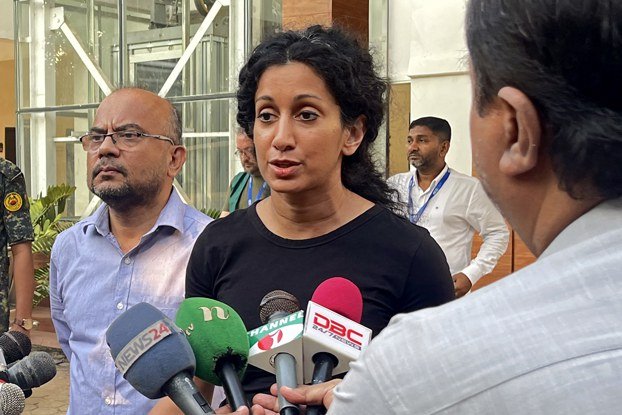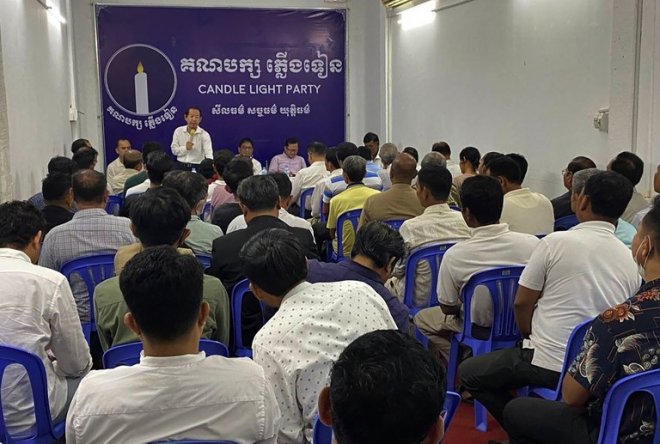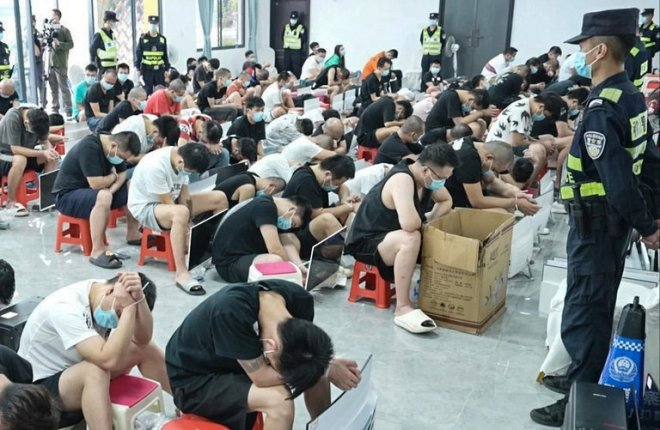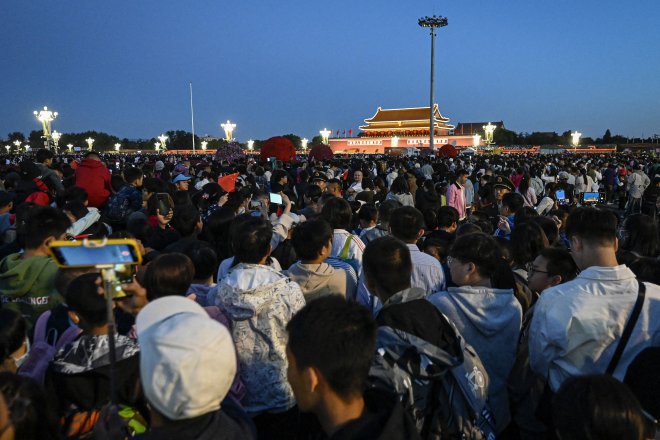Vietnam’s leaders celebrate strongest economic growth in 12 years
The announcement by the General Statistics Office of Vietnam that the country’s economy likely grew 8.02% last year led to celebration among senior members of the Communist Party, but some economists cast doubt on the accuracy of the estimate and warned conditions may be tougher this year.
On Dec. 20, Prime Minister Pham Minh Chinh called the data "a proud, bright spot in the context of a developing country,” saying it showed the economy was progressing.
His optimism was shared by Party General Secretary Nguyen Phu Trong.
"In the context of many difficulties and great challenges ... thanks to the cooperation and efforts of the whole Party, the people, the army ... the economy continues to grow rapidly, reaching 8%, much higher than the plan and a high level compared to other countries in the region and around the world,” he said at a Jan. 3 conference reviewing the government’s work last year and outlining its tasks for 2023.
Not verified
Some economists are concerned about the reliability of the data.
Economist Nguyen Tri Hieu, who has over 30 years’ experience working in banking and finance in the U.S., Germany and Vietnam, told RFA that accuracy depends on the method of calculation and the ability of the statistician, information which is not available in Vietnam
“The problem is that there is no agency to verify the statistics of the General Department of Statistics. It"s the only number we know," he said.
Hieu said in order to gauge the health of the economy it is important to consider factors such as workers’ living standards, social security, health and safety, and environmental issues.
Norway-based economist Nguyen Huy Vu, who worked for Germany’s Bundesbank, said the 8% growth figure has no meaning without considering factors that would indicate whether people are better or worse off than previous years.
“[If] the living standards of workers are not improved, many jobs are not created, the health of the economy is not increased, businesses do not increase, then the number, no matter how high, becomes meaningless," he said.
![]() Workers at a garment factory in Hung Yen province. Credit: Reuters
Workers at a garment factory in Hung Yen province. Credit: Reuters
‘People are very poor’
The owner of an electronics assembly business in Ho Chi Minh City told RFA people’s lives, especially those of unskilled workers, have been extremely difficult over the past year.
Nguyen Dinh De said processing orders have fallen because Europe and the U.S. entered what he called “an economic crisis.”
In addition, the war in Ukraine pushed up global raw material prices, particularly oil. From June to September 2022, gasoline prices in Vietnam rose above VND30,000/liter (U.S.$1.23/liter).
“People have no jobs but raw materials prices are still high, transportation costs increase, all other commodities increase in price,” De said. “The people are very poor, [their lives] are very difficult."
More than 143,000 companies went out of business last year, according to the General Statistics Office, with an average of nearly 400 bankruptcies a day.
“If the government says 8% growth is the highest rate in the past 12 years, that’s a good point. But looking at people"s lives, the difficulties of businesses, looking at the number of businesses that have to close, we understand the downside," De said.
2023 economic outlook
Even though Vietnam’s gross domestic product grew 8% and total trade value reached a record U.S.$733 billion last year, Nguyen Tri Hieu said the economy still had many problems. The most serious, he said, was the instability of financial markets, with the VN-Index losing as much as 300%, a liquidity crunch as companies struggled to sell bonds and continued weakness in the real estate sector. He said the economy will face a rough ride in the first half of this year before becoming more stable in the second half.
Nguyen Huy Vu said economic growth could be weaker this year because fewer outsourcing orders from the U.S. and Europe will cut the inflow of foreign currency.
With global interest rates rising, Vietnam will be forced to follow suit to keep exchange rates stable, Vu said. Higher borrowing costs will make it difficult for businesses to invest in higher production, he said, and manufacturers will face difficulties.
Trinh Khanh Ly, formerly at the Vietnam General Confederation of Labor and the International Labor Organization in Hanoi, is a specialist in labor law, income inequality, labor export policy and trade unions in Vietnam.
She told RFA the recovery of Vietnam"s outsourcing companies depends on the economic strength of the major markets they export to, Japan, the U.S. and the E.U.
“These are the markets that, after being greatly affected by COVID, are being heavily affected by the fuel crisis, the war in Ukraine, high inflation and are expected to continue to face many difficulties in 2023,” she said. “Therefore, I think Vietnam should prepare for a worse scenario where the loss of jobs in these enterprises will continue to occur in 2023 and the next few years."
Translated by RFA Vietnamese. Edited by Mike Firn.
[圖擷取自網路,如有疑問請私訊]
On Dec. 20, Prime Minister Pham Minh Chinh called the data "a proud, bright spot in the context of a developing country,” saying it showed the economy was progressing.
His optimism was shared by Party General Secretary Nguyen Phu Trong.
"In the context of many difficulties and great challenges ... thanks to the cooperation and efforts of the whole Party, the people, the army ... the economy continues to grow rapidly, reaching 8%, much higher than the plan and a high level compared to other countries in the region and around the world,” he said at a Jan. 3 conference reviewing the government’s work last year and outlining its tasks for 2023.
Not verified
Some economists are concerned about the reliability of the data.
Economist Nguyen Tri Hieu, who has over 30 years’ experience working in banking and finance in the U.S., Germany and Vietnam, told RFA that accuracy depends on the method of calculation and the ability of the statistician, information which is not available in Vietnam
“The problem is that there is no agency to verify the statistics of the General Department of Statistics. It"s the only number we know," he said.
Hieu said in order to gauge the health of the economy it is important to consider factors such as workers’ living standards, social security, health and safety, and environmental issues.
Norway-based economist Nguyen Huy Vu, who worked for Germany’s Bundesbank, said the 8% growth figure has no meaning without considering factors that would indicate whether people are better or worse off than previous years.
“[If] the living standards of workers are not improved, many jobs are not created, the health of the economy is not increased, businesses do not increase, then the number, no matter how high, becomes meaningless," he said.
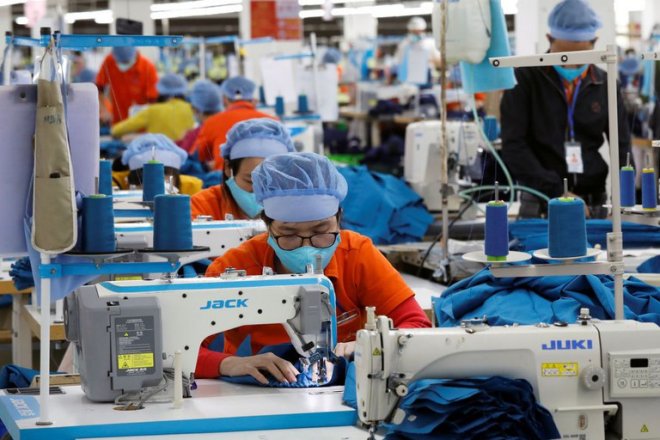 Workers at a garment factory in Hung Yen province. Credit: Reuters
Workers at a garment factory in Hung Yen province. Credit: Reuters‘People are very poor’
The owner of an electronics assembly business in Ho Chi Minh City told RFA people’s lives, especially those of unskilled workers, have been extremely difficult over the past year.
Nguyen Dinh De said processing orders have fallen because Europe and the U.S. entered what he called “an economic crisis.”
In addition, the war in Ukraine pushed up global raw material prices, particularly oil. From June to September 2022, gasoline prices in Vietnam rose above VND30,000/liter (U.S.$1.23/liter).
“People have no jobs but raw materials prices are still high, transportation costs increase, all other commodities increase in price,” De said. “The people are very poor, [their lives] are very difficult."
More than 143,000 companies went out of business last year, according to the General Statistics Office, with an average of nearly 400 bankruptcies a day.
“If the government says 8% growth is the highest rate in the past 12 years, that’s a good point. But looking at people"s lives, the difficulties of businesses, looking at the number of businesses that have to close, we understand the downside," De said.
2023 economic outlook
Even though Vietnam’s gross domestic product grew 8% and total trade value reached a record U.S.$733 billion last year, Nguyen Tri Hieu said the economy still had many problems. The most serious, he said, was the instability of financial markets, with the VN-Index losing as much as 300%, a liquidity crunch as companies struggled to sell bonds and continued weakness in the real estate sector. He said the economy will face a rough ride in the first half of this year before becoming more stable in the second half.
Nguyen Huy Vu said economic growth could be weaker this year because fewer outsourcing orders from the U.S. and Europe will cut the inflow of foreign currency.
With global interest rates rising, Vietnam will be forced to follow suit to keep exchange rates stable, Vu said. Higher borrowing costs will make it difficult for businesses to invest in higher production, he said, and manufacturers will face difficulties.
Trinh Khanh Ly, formerly at the Vietnam General Confederation of Labor and the International Labor Organization in Hanoi, is a specialist in labor law, income inequality, labor export policy and trade unions in Vietnam.
She told RFA the recovery of Vietnam"s outsourcing companies depends on the economic strength of the major markets they export to, Japan, the U.S. and the E.U.
“These are the markets that, after being greatly affected by COVID, are being heavily affected by the fuel crisis, the war in Ukraine, high inflation and are expected to continue to face many difficulties in 2023,” she said. “Therefore, I think Vietnam should prepare for a worse scenario where the loss of jobs in these enterprises will continue to occur in 2023 and the next few years."
Translated by RFA Vietnamese. Edited by Mike Firn.
[圖擷取自網路,如有疑問請私訊]
|
本篇 |
不想錯過? 請追蹤FB專頁! |
| 喜歡這篇嗎?快分享吧! |
相關文章
AsianNewsCast









